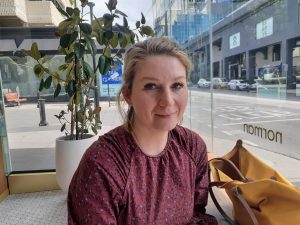Ukrainian doctor doing her bit
When her homeland was invaded by Russia in February 2022, Ukrainian-born doctor Oksana Nesterenko did the only thing she could think of to support her compatriots.
She offered free medical care to Ukrainians arriving in Melbourne after fleeing the conflict.
In the weeks after the conflict began, Ukrainian refugees were arriving in Australia on tourist visas and initially were not eligible for medical support through Medicare.
In those early weeks, Dr Nesterenko and her colleagues at the private ‘MyClinic’ medical practice in South Yarra treated hundreds of Ukrainian refugees.
“We treated Ukrainians from all over Melbourne. Mostly the elderly and women and their children. They heard about us by word of mouth,” she said.
 Dr Nesterenko said many medical centres and practices across Melbourne have since risen to the challenges of supporting the Ukrainian arrivals.
Dr Nesterenko said many medical centres and practices across Melbourne have since risen to the challenges of supporting the Ukrainian arrivals.
“There has been great support from other medical practices and allied health practitioners; Cabrini refugee health, Monash refugee health, St Vincent’s Hospital and the Royal Children’s Hospital included,” she said.
Dr Nesterenko moved to Australia five years ago. She left Ukraine for England in 2001 where she qualified as a GP.
“When the war started in Ukraine my family remained in Ukraine. They didn’t want to travel because my grandmother is very old and my brother is in the reserves,” she said.
“I started seeing patients from Ukraine after they began arriving and before they became eligible for Medicare.
“I felt it was the right thing to do and a way in which I could make a small contribution to what is happening in Ukraine. I’m grateful for my colleagues at our clinic for supporting me. I told them what I wanted to do and they agreed.
“The staff at our practice have been amazing. Supporting the Ukrainians has meant extra work for them and there have been issues with language but everyone has stepped up to help.
“We’ve had to assess people’s immunisation status and also convert medication they have been taking because the medical system in Ukraine is quite different,” Dr Nesterenko said.
She said accessing mental health care and allied health treatments remained an issue for some Ukrainians.
“Some people are having difficulty accessing psychological care. Part of the problem is finding psychologists who can speak Ukrainian or Russian to communicate with them.
Dr Nesterenko is from the Poltava Oblast near the city of Kharkiv, which was attacked and almost surrounded by Russian forces in the early weeks of the conflict.
“There have been lots of people affected by the war, lots of people have become refugees,” she said.
“We never thought a war would happen in Ukraine. It came as a huge shock,” Dr Nesterenko said.
But she said all Ukrainians believed in ultimatum.
“Ukraine will achieve victory in the end but losses have been terrible – for us as well as for Russia. You can only hope this is a wake-up call for the Russian people,” Dr Nesterenko said.
“My mother always said that wars always happen somewhere far away but now it’s in our country. It makes you think of people who have suffered from war a lot – like in Syria, where there has been war and earthquakes recently.”
Dr Nesterenko has a six-year-old daughter who was born in the UK but has visited Ukraine often. However, she has not been able to visit her family there since 2019 because of COVID and the war.
“It’s a shame she has been able to see her grandparents or family,” she said.
One of those family members is her ninety-three year-old grandmother Baba Nadia who endured Stalin’s famine in the 1930s and World War II as a child. She outlived the Soviet Union and survived Chernobyl and two Ukrainian revolutions.
Now, she has been plunged into the hardships and fears created by Vladimir Putin’s invasion of the country.
“It’s a shame that now, at her age, she has to live though another war,” Dr Nesterenko said.












